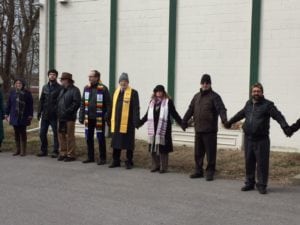
Clergy from all faiths joined hands with others to show unity with the Muslim community Friday at the Louisville Islamic Center. (photo by Lee Chottiner)
Holding hands, praying for peace, parading in frigid temperatures, more than 50 of Louisville’s faith-based leaders, including several Jews, gathered at the Louisville Islamic Center on Friday, February 3 — the Muslim sabbath — to form a “circle of love” at the religious site and to show their support for worshippers inside the mosque.
It was one of two such circles of love that day. By sundown — the start of the Jewish sabbath — Muslim leaders, including members of the Muslim Americans for Compassion (MAC), and Christians, held hands inside the sanctuary at Temple Shalom, ringing the congregation as it remained seated. One by one, they each expressed a personal prayer for peace as the Jewish community watched the remarkable gesture.
Temple Shalom, along with Keneseth Israel Congregation, were victims of hate calls the previous Friday — International Holocaust Remembrance Day.
Dr. Mohammed Babar, president of the MAC, later addressed the congregation from the bima. While noting that Jews and Muslims have political differences – he specifically mentioned the Israel-Palestine conflict – Babar said there is more that unites the two peoples than divides them.
“Your lives are as sacred, and your security and wellbeing as important, as the lives, security and wellbeing of our own … families,” Babar said. “We are one human family.”
The gathering at the Islamic Center, organized by the Kentucky Council of Churches, came after President Trump’s issuance of an executive order banning people from seven mostly Muslim countries from entering the country. It also came after a mass shooting at one mosque in Quebec City, Quebec, and the burning of another in Victoria, Texas.
As they did at Temple Shalom, participants at the Islamic Center joined hands – outside the mosque in this case – while taking turns uttering prayers for peace.
Rabbi Beth Jacowitz Chottiner, of Temple Shalom, chanted Od Yavo Shalom Aleinu.
Rabbi Joe Rooks Rapport of The Temple, said Osey Shalom.
And Rabbi Gaylia R. Rooks, also of The Temple, invoked a verse by the late Israeli poet Yehuda Amichai, saying that when people choose war they should have to turn their plowshares back into swords.
Three times the people paraded around the mosque in a circle of love before entering the building, taking off their shoes and walking upstairs to the sanctuary where the service was already in progress.
They sat quietly on the floor to the rear of the room as the imam, Mohammed Wasif Iqbal, spoken of mercy to his congregants.
He said mercy was not something to be shown just to Muslims, to adherents of any particular faith, or even to people in general. Mercy is something to be constantly expressed, even to animals.
“Show mercy to a goat, and God will show mercy to you,” Wasif said.
Rev. Peggy Hinds, interim executive director of the Kentucky Council of Churches, said she was pleased, not only with the turnout, but the response from the Muslim community, which invited the visitors into its mosque and shared its food with them after the service.
“The Muslim community feels supported,” said Hinds, a Presbyterian minister. “That alone was worth doing it.
“Plus,” she added, “we get to experience part of their prayers, and that was good for us. For some, it may have been the first time. There is a wonderful cadence and calmness [to the prayers]. I just wanted to close my eyes and listen.”
Wasif said his congregation does appreciate the support. Happily though, it’s not unusual. By his count, at least 600 visitors came to the Islamic Center in 2016 as talk of Muslim bans and a Muslim registry made headlines during the campaign season.
“This is something regular, almost on a weekly basis,” he said. “We love people visiting. It’s something we appreciate greatly.”
The Temple’s Rapport also expressed admiration for the gathering — inside and outside the mosque.
“Nice expression of unity,” he said. “We should all be able to pray together.”



